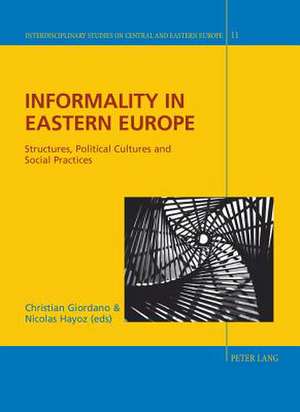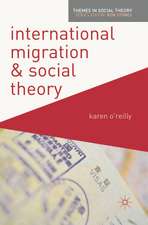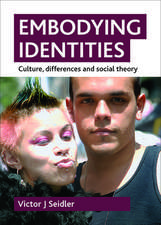Informality in Eastern Europe: Interdisciplinary Studies on Central and Eastern Europe, cartea 11
Editat de Christian Giordano, Nicolas Hayozen Limba Engleză Hardback – 12 noi 2013
Din seria Interdisciplinary Studies on Central and Eastern Europe
- 23%
 Preț: 588.85 lei
Preț: 588.85 lei - 23%
 Preț: 668.81 lei
Preț: 668.81 lei - 23%
 Preț: 484.87 lei
Preț: 484.87 lei - 23%
 Preț: 499.54 lei
Preț: 499.54 lei - 23%
 Preț: 560.10 lei
Preț: 560.10 lei -
 Preț: 369.09 lei
Preț: 369.09 lei - 8%
 Preț: 531.66 lei
Preț: 531.66 lei - 9%
 Preț: 631.49 lei
Preț: 631.49 lei - 9%
 Preț: 654.71 lei
Preț: 654.71 lei - 23%
 Preț: 622.51 lei
Preț: 622.51 lei - 27%
 Preț: 824.22 lei
Preț: 824.22 lei - 23%
 Preț: 527.71 lei
Preț: 527.71 lei -
 Preț: 392.13 lei
Preț: 392.13 lei - 20%
 Preț: 386.37 lei
Preț: 386.37 lei - 21%
 Preț: 459.68 lei
Preț: 459.68 lei
Preț: 827.16 lei
Preț vechi: 1133.10 lei
-27% Nou
Puncte Express: 1241
Preț estimativ în valută:
158.27€ • 166.14$ • 131.37£
158.27€ • 166.14$ • 131.37£
Carte tipărită la comandă
Livrare economică 11-25 aprilie
Preluare comenzi: 021 569.72.76
Specificații
ISBN-13: 9783034314558
ISBN-10: 3034314558
Pagini: 490
Ilustrații: 26 tab./9 fig.
Dimensiuni: 161 x 231 x 36 mm
Greutate: 0.83 kg
Editura: Peter Lang Gmbh, Internationaler Verlag Der W
Seria Interdisciplinary Studies on Central and Eastern Europe
ISBN-10: 3034314558
Pagini: 490
Ilustrații: 26 tab./9 fig.
Dimensiuni: 161 x 231 x 36 mm
Greutate: 0.83 kg
Editura: Peter Lang Gmbh, Internationaler Verlag Der W
Seria Interdisciplinary Studies on Central and Eastern Europe
Notă biografică
Cuprins
Contents: Christian Giordano/Nicolas Hayoz: Introduction: Exploring Informality in Eastern Europe through Different Disciplines - Christian Giordano: The Social Organization of Informality: The Rationale Underlying Personalized Relationships and Coalitions - Nicolas Hayoz: Observations on the Changing Meanings of Informality - Anton Sterbling: Aspects of «Informality» - with Particular Focus on South-Eastern Europe - Kristof Van Assche/Anastasiya Shtaltovna/Anna-Katharina Hornidge: Visible and Invisible Informalities and Institutional Transformation in the Transition Countries of Georgia, Romania, and Uzbekistan - Maximos Aligisakis: Shadow Economy, Corruption and Informal Political Exchanges: The Greek Case in a Comparative Perspective - Nicole Gallina: Analysing Informality: A Case-Study Based Concept applied to the Czech Republic - Veronika Pasynkova: The Synchronization of Communist Legacy in Postcommunist Politics and Labour: the Case of Poland - Tanya Chavdarova: Institutionalization of Market Order and Reinstitutionalization of Vruzki (Connections) in Bulgaria - Katerina Gehl/Klaus Roth: The Everyday Culture of Informality in Post-Socialist Bulgarian Politics - Sonja Schüler: Abuse of Office, Informal Networks, «Moral Accountability» - Political Corruption in Bulgaria - Edvin Zhllima/Drini Imami Informality: Informality in Albania - The Case of Rural Land Tenure and Transactions - Adem Beha: Contested Statebuilding in Kosovo: the Nature and Characteristics of Serbian Parallel Structures - Fanny Sbaraglia: «They are with the Others»: From Gossip to Stigmatization, Romanian Civil Society through an Informal Perspective - François Ruegg: Social Representations of Informality: the Roma Case - Jonathan Wheatley: Informal and Formal Institutions in the Former Soviet Union - Galina Michaleva: The Dominance of Informal Politics on the Eve of the Electoral Year 2011-2012 - Elvira Leontyeva: Corruption Networks in the Sphere of Higher Education: An Example from Russian Mass Universities - Elena Denisova-Schmidt: How Unwritten Rules Can Influence Human Resource Management in Russia - Andrea Friedli: Informality as a «Weapon of the Weak»? Public Representation of Tatar Youth Movements in Kazan, Russia - Abel Polese: The Ambiguity and Functions of Informality: Some Notes from the Odessa-Chisinau Route - Rail Safiyev: Informality in a Neopatrimonial State: Azerbaijan - Alexander Iskandaryan: Formalization of the Informal: Statebuilding in Armenia - Giga Zedania Informality and the Question of Modernization: the Case of Georgia.















